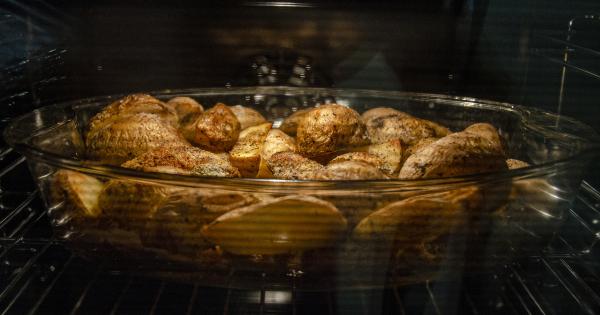Diarrhea is a common digestive problem that is characterized by loose, watery stools and often accompanied by abdominal pain, cramping, and dehydration.
While there are various causes of diarrhea, including viral or bacterial infections, food poisoning, medication side effects, or certain medical conditions, making changes to your diet can help alleviate the symptoms and promote faster recovery. In this article, we will explore the foods that can help ease diarrhea symptoms and assist in the healing process.
1. Stick to a BRAT Diet
When you experience diarrhea, it is recommended to follow a BRAT diet, which stands for bananas, rice, applesauce, and toast. These bland and easily digestible foods can help bind your stools and promote more solid bowel movements.
Bananas are a great source of potassium and can help replace electrolytes lost during diarrhea. They are gentle on the stomach and can help reduce inflammation in the gut. Opt for ripe bananas as they are easier to digest.
Rice is another essential component of the BRAT diet. Plain white rice can help soothe your stomach and provide you with some energy. Avoid adding any spices or condiments to keep it gentle on your digestive system.
Applesauce is a good source of pectin, a soluble fiber that can help bulk up your stools. Opt for unsweetened applesauce to avoid worsening your symptoms with added sugars.
Toast, preferably made from white bread, can help absorb excess water in your digestive tract and provide some relief from diarrhea. Avoid using spreads or butter on your toast.
2. Consume Probiotic Foods
Probiotic foods contain beneficial bacteria that can help restore a healthy balance to your gut microbiome, which plays a crucial role in digestion and overall gastrointestinal health.
Adding probiotic-rich foods to your diet can help ease diarrhea symptoms and promote better gut function.
Yogurt is one of the most popular probiotic-rich foods. Look for yogurt that contains live and active cultures, such as Lactobacillus or Bifidobacterium strains.
These cultures can help regulate your digestive system and reduce the duration of diarrhea episodes.
Other fermented foods, such as kefir, sauerkraut, kimchi, and tempeh, also contain beneficial probiotics that can help alleviate diarrhea symptoms.
Be sure to choose unpasteurized versions, as the pasteurization process can kill the beneficial bacteria.
3. Stay Hydrated
One of the most important aspects of managing diarrhea is staying hydrated. Diarrhea can lead to fluid loss and electrolyte imbalances, so it is crucial to replenish your body with fluids and essential minerals.
Water is the simplest and most important fluid to consume when experiencing diarrhea. Sip on small amounts frequently to avoid overwhelming your digestive system.
Clear broths, such as chicken or vegetable broth, can provide both hydration and some necessary nutrients. The warmth of the broth can also soothe your stomach.
Avoid caffeinated and alcoholic beverages as they can further dehydrate your body and worsen diarrhea symptoms.
Oral rehydration solutions like Pedialyte or Gatorade can be beneficial, especially if you have been experiencing severe diarrhea and dehydration.
These solutions contain a balanced mix of electrolytes and can help restore the lost minerals in your body.
4. Incorporate Bland Foods
When dealing with diarrhea, it is best to consume bland foods that are gentle on your digestive system. These foods are easily digestible and help soothe your stomach, aiding in the recovery process.
Boiled or baked chicken without the skin is a good source of lean protein that is easier to digest compared to fatty meats. Be sure to avoid using any heavy spices or seasonings.
Steamed or boiled vegetables, such as carrots or squash, can provide essential nutrients and fiber without exerting additional stress on your digestive system. Avoid eating raw vegetables until your diarrhea symptoms have completely resolved.
Plain oatmeal made with water or low-fat milk can offer a comforting and easy-to-digest meal. Avoid adding sugar or high-fiber toppings until your digestion improves.
5. Avoid Certain Foods
While there are foods that can help ease diarrhea symptoms, there are also foods that should be avoided as they can aggravate your condition or further irritate your digestive system.
High-fiber foods, such as bran cereals, whole grains, and legumes, should be temporarily eliminated from your diet as they can worsen diarrhea and lead to further discomfort.
Avoid consuming greasy or fried foods, as they are harder to digest and can exacerbate diarrhea symptoms. These foods can also irritate your stomach lining.
Spicy foods and those containing excessive amounts of chili peppers or hot sauces should be avoided, as they can stimulate your digestive system and worsen diarrhea symptoms.
Dairy products may also need to be temporarily eliminated from your diet, as diarrhea can cause temporary lactose intolerance. You may reintroduce dairy gradually once your symptoms have resolved.
6. Try the BRATY Diet
To enhance the benefits of the BRAT diet, you may consider adding “Y” to create the BRATY diet.
The “Y” stands for yogurt, as it contains probiotics that can help restore the balance of bacteria in your gut and aid in faster recovery from diarrhea.
7. Opt for Low-Fat Foods
Choosing low-fat foods while experiencing diarrhea can help make digestion easier. Fat can exacerbate diarrhea and may be harder to process for the digestive system.
Opt for lean cuts of meat, such as skinless chicken breast or turkey, and avoid fried or high-fat options.
Choose low-fat dairy products or non-dairy alternatives to reduce the risk of aggravating your symptoms.
8. Stay Away from Irritating Beverages
Some beverages can irritate your digestive system and worsen diarrhea symptoms. It is important to avoid them until your condition improves.
Avoid drinking caffeinated beverages like coffee, tea, or energy drinks as they can stimulate your digestive system and lead to increased bowel movements.
Highly acidic beverages, such as citrus juices or carbonated drinks, might irritate your stomach and exacerbate diarrhea. Stick to mild and gentle fluids instead.
9. Use Herbal Remedies
Certain herbal remedies have been traditionally used to ease digestive problems, including diarrhea.
However, it is important to consult with your healthcare provider before using any herbal remedies, especially if you are taking medications or have underlying health conditions.
Peppermint tea has been shown to have antispasmodic properties, which can help relax the muscles of the gastrointestinal tract and alleviate cramping associated with diarrhea.
Chamomile tea can help reduce inflammation in the gut and provide a calming effect on the digestive system. It may also help relieve diarrhea symptoms caused by stress or anxiety.
Ginger has long been recognized for its digestive benefits. Consuming ginger tea or adding fresh ginger to your meals can help soothe your stomach and alleviate diarrhea symptoms.
10. Gradually Reintroduce Regular Foods
Once your diarrhea symptoms have subsided, it is important to gradually reintroduce regular foods into your diet. Start with small quantities of easily digestible foods and monitor your body’s response.
Slowly reintroduce high-fiber foods, dairy products, and other items that were temporarily eliminated from your diet.
This will help you determine if any specific foods trigger your diarrhea and allow you to make necessary dietary adjustments going forward.
Remember, everyone’s digestive system is unique, and what works for one person may not work for another.
If you have persistent or severe diarrhea, it is important to consult with a healthcare professional to determine the underlying cause and receive appropriate treatment.


























